Caring for a Senior Cat: Signs of Old Age
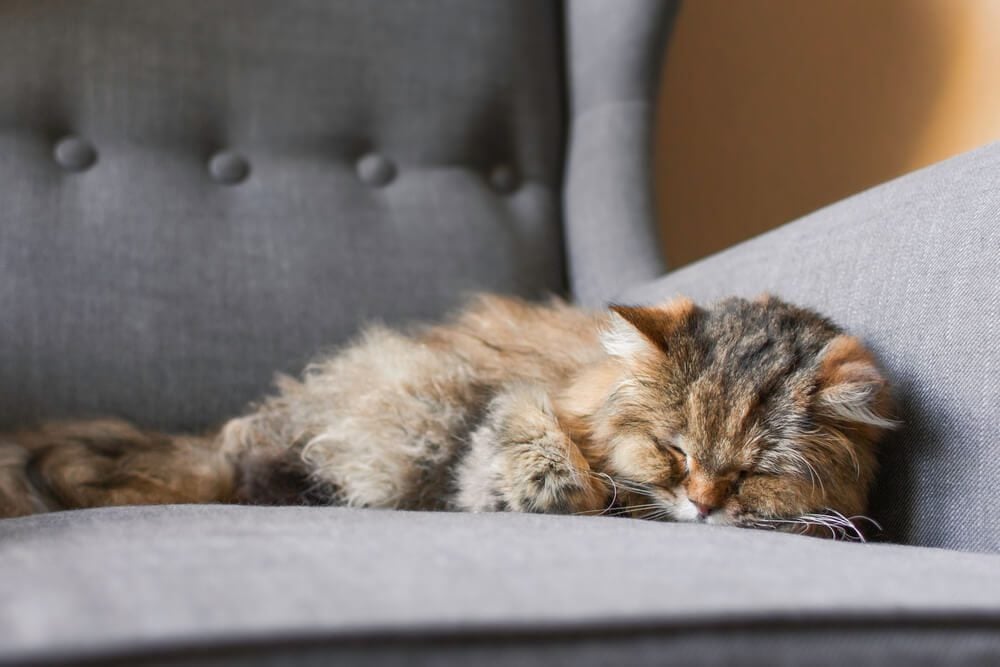
Table of Contents
You know that moment when you realize it’s been a decade since an event that feels like it was yesterday? If you’re looking at your feline and remembering their playful kitten years but seeing a lazier, older, chubbier, and dismissive cat, it may dawn on you that they’ve entered their golden years.
It could feel like time has flown, and suddenly your cat is hitting its teen years. “How do I care for my old cat?” you may ask? Do elderly cats need more wellness visits?
These questions may be on your mind, and we’re here to guide you on how to provide your senior cat with quality of life as the years move on.
Is My Cat Considered a Senior?
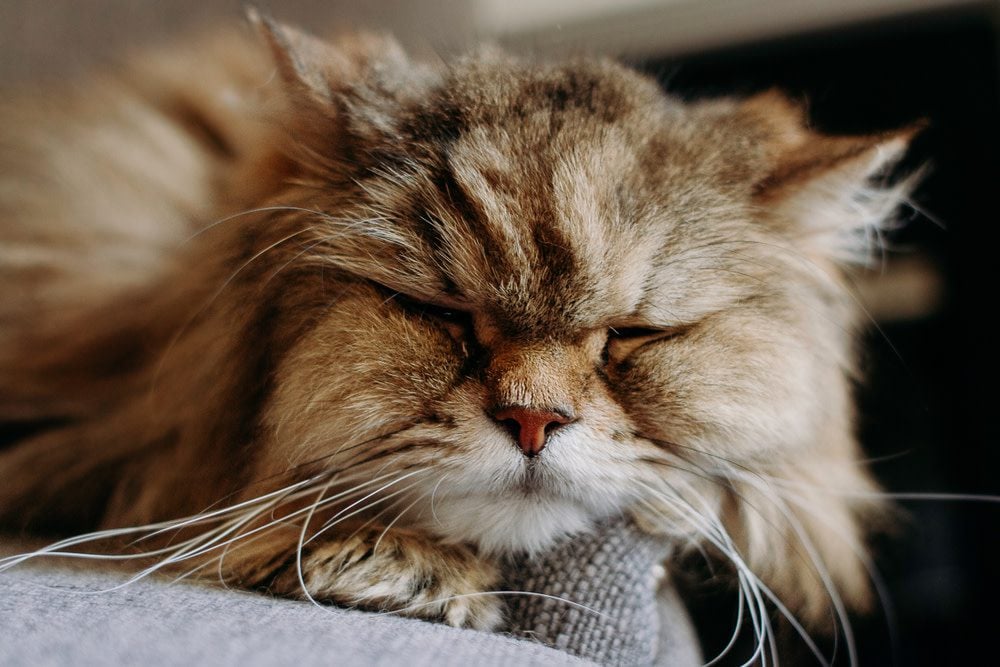
The American Association of Feline Practitioners (AAFP) defines a senior cat as one who has lived between 11 and 14 years. At this stage, your furry friend is the equivalent of a human adult in their sixties or seventies.
Understanding the Different Life Stages of Cats
Felines live through many life stages, and the acceleration of aging varies from one cat to the next. The speed of aging is dependent on genetics, environments, and health care. Each life stage comes with its health risks; a cat age classification defines cats’ life stages:
- Kitten – Birth to 6 months
- Junior – 5 months to 2 years old
- Prime – 3 years to 6 years of age
- Mature – 7 to 10 years of age
- Senior – 11 to 14 years old
- Geriatric – age 15 and older
Cats over 11 years of age are officially in their senior years. For pet parents, this means that they will need to repay a decade of cuddles with some additional cat care and be on the lookout for any changes in behavior and signs of aging. Nurturing your cat during their prime and mature years will set you on the right path once your cat reaches senior age.
Is My Cat Sick, or is it Old Age?
Older cats may slow down and show less interest in things that would usually excite them. Pet parents should never dismiss this behavior and attribute it to the aging process.
Senior cats who show physical changes or mood lows should be taken to the veterinarian for a check-up. For example, a period of cat depression can be more than occasional sadness and be a symptom of a deeper health problem.
Health conditions show up in several ways, and knowing what to look out for and being attentive to your cat’s behavior can lead to an early diagnosis, thorough treatment, and a happier cat.
If you’ve overlooked your cat’s ability to jump on the counter for their food bowl, or if their coat is looking a little shabby, or maybe they didn’t make it to the litter box in time, these are all disease symptoms you need to note down for the vet.
What to Watch for in a Cat’s Senior Years
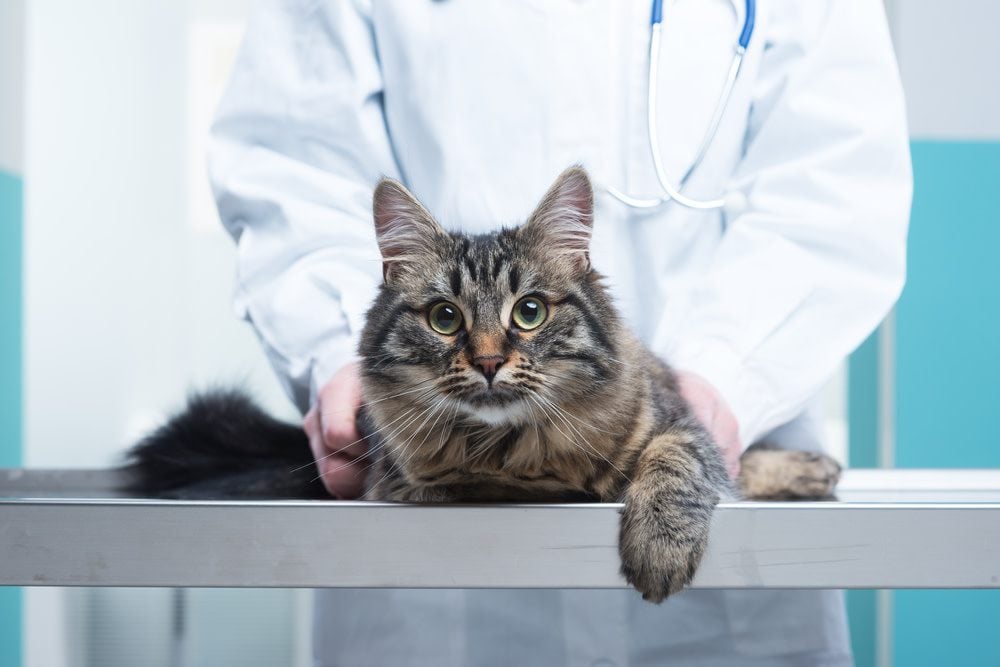
Right, so now you know that even a small change in your cat’s body condition can signal something huge, you need to learn what symptoms to observe. Some of them may seem mild but jot them down so that you can tell your vet about it on your kitty’s next visit.
If your cat ticks the box for more than one of these signs, or several, then they may need medical care as soon as possible.
- Pain
- Excessive thirst
- Change in sleeping habits
- Weight loss or weight gain according to a body condition score from previous visits
- Appetite changes or disinterest in food
- Litter box changes or house soiling; stool quality (number, volume, consistency, odor, color) or a change in urination frequency
- Alterations in their human interaction or socially with other pets
- Excessive grooming (associated with pain) or a lack of grooming (due to mobility issues)
- Vomiting or signs of nausea
- Bad breath
- Mobility issues
- Signs of vision or hearing loss (decreased responsiveness, increased vocalization)
- Changes in breathing or other obvious physical concerns
A cat that is in its final weeks or days will display depressed behavior. They may stop eating or drinking and sleep a lot more. Dying cats often hide away and withdraw from their family. Speak to your veterinarian if you think it’s time to say goodbye to your cat.
Common Diseases for Older Cats
A recent study reported that 28 percent of felines in their senior years develop at least one geriatric onset behavioral problem. Unfortunately, many diseases that present in senior cats are left undetected by family members.
Arthritis
Osteoarthritis (OA) is a joint disease that signals the degeneration of joint cartilage in feline patients. Arthritis is irreversible, but weight loss and pain management can help reduce inflammation.
In radiographic studies, the prevalence of arthritis varies from 22% in cats of all ages to 90% in senior or geriatric cats. Look out for limping, mobility issues, loss of muscle mass, or neglectful grooming habits.
Dental Disease
Does your cat have a stinky breath? Cats and dogs with dental disease will avoid eating. The three most common dental conditions in cats are periodontitis, gingivitis, and tooth resorption. An infection that’s left untreated can lead to liver, heart, and kidney disease.
Kidney Disease
Kidney failure happens when kidney waste builds up due to an inability to filter waste and excess fluid from the blood. Several things can bring on kidney failure. The main symptom is excessive thirst. Blood work and urine analysis are needed to confirm kidney failure.
Hyperthyroidism
Endocrine diseases like diabetes and hyperthyroidism are common in older cats. With hyperthyroidism, the thyroid hormone is produced in abundance by the malfunctioning thyroid gland and circulated through the feline bloodstream.
Symptoms include weight loss, vomiting, diarrhea, increased urination and thirst, increased appetite, high blood pressure, and hyperactivity.
Lower Urinary Infections
Cats get lower urinary tract infections when their bladder, urethra, or the surrounding structures malfunction or experience abnormalities. Causes include idiopathic cystitis, urine stones, and urethral obstruction.
Symptoms for UTIs surround litter boxes, with painful and frequent urination, vocalization while urinating, blood in the urine, incontinence, licking of the genital or abdominal area.
Inflammatory Bowel Disease
IBD is used to describe a gastrointestinal disease, usually caused by diet, bacterial infection, or parasitic infestations. It is a chronic irritation of the intestines or stomach and is common in older cats. Vomiting, weight loss, and poor appetite are signs of IBD.
Caring for Your Senior Cat
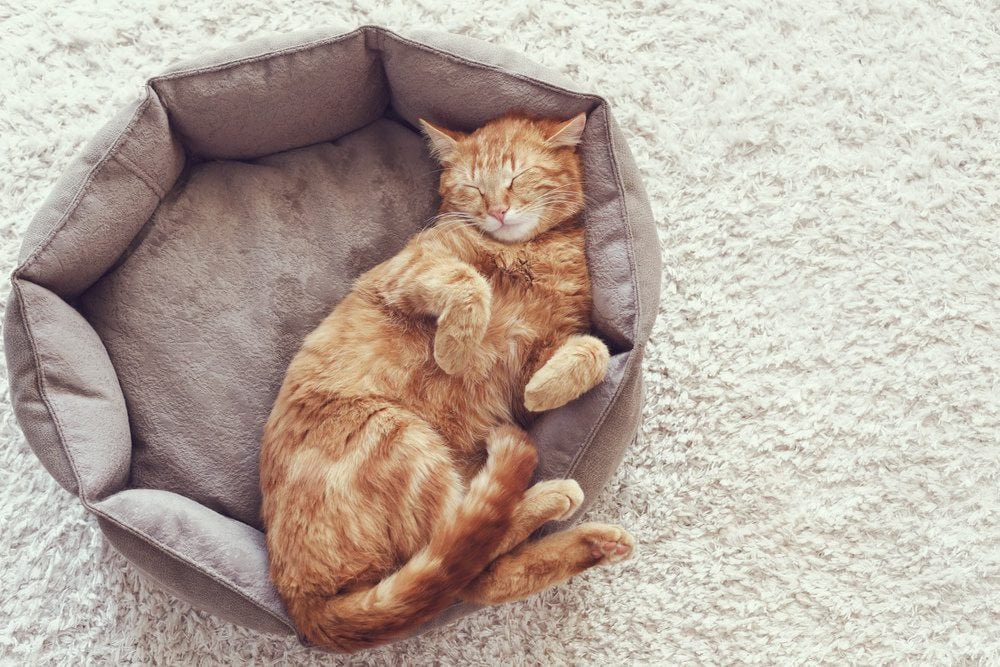
Ensuring your cat has the quality of life is a commitment you make the day you welcome them into your home. During their golden years, there are some things that you can do to help your older cat feel cared for and loved.
- Regular wellness exams are the number one way to care for your cat of any age. Preventative care and wellness exams can prevent many illnesses.
- Monitor their weight. An overweight or obese cat is susceptible to a range of issues and painful arthritis. Protect them by monitoring their weight with a healthy diet and portion control.
- Support your cat’s immune system. You can do this with various supplements eg. Honest Paws CBD Oil for Cats – Well or natural solutions that boost and support immune function.
- Assist their mobility by providing easy low-level access to the outdoors, their food, and their litter box.
- Examine the litter box contents. Your cat’s pee and poo communicate, and it’s essential to know what’s normal and what’s not.
- Good food, healthy pet! Make sure you give your cat food that is appropriate for their life stage and dietary needs. Clean water is also vital for their wellbeing, so make sure they have easy access to their water bowl.
- Know the signs of pain. Cats intrinsically hide their pain as a way to protect themselves in the wild. Withdrawn behavior, sleeping more, lethargy, and reduced appetite are just a few ways your cat silently shows its discomfort.
- Kitty pamper sessions. Grooming is something that a senior cat may find challenging. Spend some time indulging your older cat: clip their nails, brush their coat, and clean their teeth.
- Provide palliative care when your cat is in its final months. You can do this by providing a comfortable sleeping space to support sore joints and pain management or therapies that ease symptoms.
CBD for Your Senior Cat
If you’re looking for a holistic option to help your cat with overall wellness in their old age, you may want to consider CBD.
- CBD Promotes Relaxation: CBD is a great, all-natural remedy for promoting relaxation in stressed out cats.
- CBD Supports Joint Health: CBD has the ability to support joint and bone health in your cat.
- CBD Supports Sensitive Skin: CBD supports sensitive skin and fights seasonal allergies in cats.
- CBD Supports Cognitive Function & Immune System: Lastly, CBD for cats supports cognitive function as well as their immune system. It is the perfect way to support their overall health and well-being.
CBD works by interacting with a cat’s internal endocannabinoid system, helping to support normal cardiovascular, immune, and neurological function. But CBD can also help with promoting relaxation in cats, helping with occasional discomfort, and even supporting mobility – just take a look at all the success stories of pet parents who’ve used CBD for these reasons and more.
The best part is that CBD for cats comes in an easy-to-use form: CBD oil! This makes it incredibly easy to administer CBD to your kitty – in fact, most cats look forward to their daily dose of CBD thanks to the delicious flavors CBD comes in.
How Your Vet Can Help
When a cat is in their prime years, they’re at peak health. During this time, pet owners drop the habit of annual wellness exams since nothing is amiss with their kitty. But just as people get older and require more medical care, so too do our feline friends.
The frequency of veterinary examinations should increase as cats age. Experts agree that healthy senior cats should be examined every six months, while younger cats can visit their veterinarian every year.
Regular visits are desirable for the following reasons:
- Health decline is quicker in cats than in humans.
- Weight gain or loss can be addressed before it’s serious.
- Cats hide their pain, and issues can lie undetected for years if they aren’t examined regularly.
- Early detection of the disease means proactive management and treatment rather than emergency care.
- Regular blood tests, fecal examinations, weight checks, and urine analysis exams give pet owners peace of mind that their kitty is at optimal health.
From kitten to senior years, veterinary exams should be a priority. Not only will it add years to your cat’s life, but it will help your vet to become familiar with your pet and gather a medical record that informs and prevents future complications.
You don’t need to carry the responsibility of your cat’s health alone. By partnering with your vet, you’ll know when your cat needs follow-up vaccinations, a diet adjustment, or supplement support. Routine chemistry panel work will be beneficial for avoiding severe illness.
Giving Your Senior Cat Their Purrfect Life
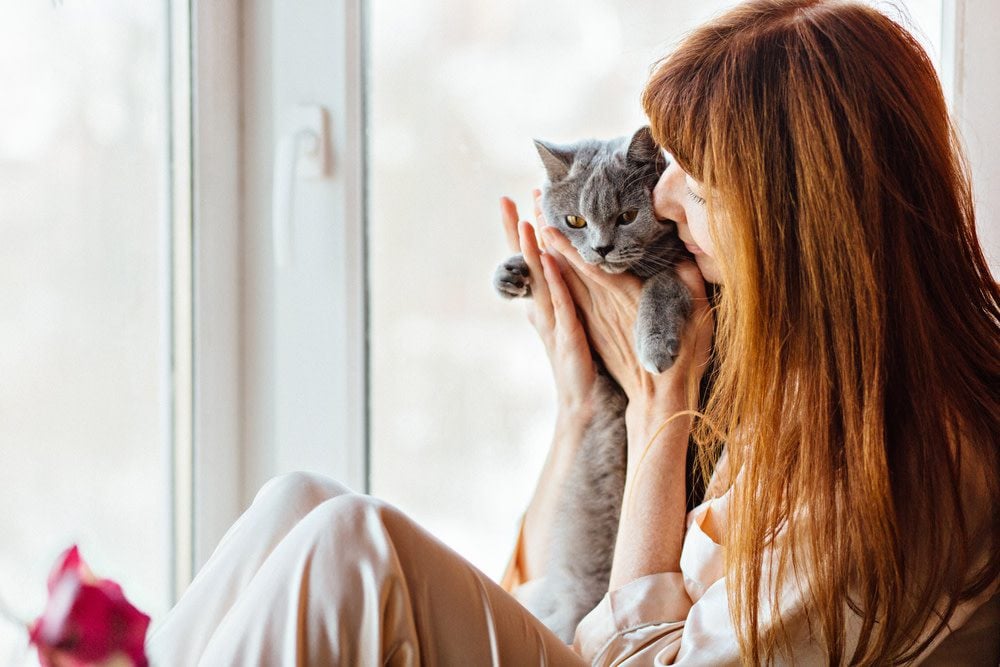
When pet owners recognize the significance of cats’ behavior changes, these precious pets can happily live through their senior years and ease into a geriatric season.
Early diagnosis of treatable medical conditions or making changes to your cat’s life so that they can live comfortably with a chronic illness can make all the difference between a cat that deteriorates quickly or one that has a comfortable and rewarding life.
If your cat has made it to its senior year, then you don’t need to panic about these potential illnesses. Celebrate your cat’s life. After all, aging is a gift that we all need to treasure. Yes, more care needs to be taken, but isn’t that true of anything precious to us?
Frequently Asked Questions
What are the signs of a cat dying of old age?
A cat that is in its final weeks or days will display depressed behavior. They may stop eating or drinking and sleep a lot more. Dying cats often hide away and withdraw from their family. Speak to your veterinarian if you think it’s time to say goodbye to your cat.
Is a 7-year-old cat a senior?
Cats that are seven years old are in the mature stage of their life. Senior cats are between the ages of 11 and 14 years.
What should I expect with a senior cat?
Older cats may slow down and show less interest in things that would usually excite them. Pet parents should never dismiss this behavior and attribute it to the aging process. Senior cats who show physical changes or mood lows should be taken to the veterinarian for a check-up.
What age is a geriatric cat?
Geriatric cats are 15 years or older.
















